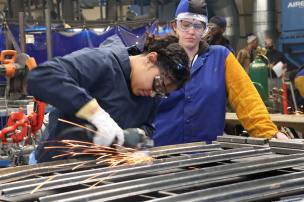
TVET (Technical and Vocational Education and Training) is an important investment for a new workforce that is lacking in skilled workers. Similar to other developing countries, Indonesia has already established a policy for 12 years of compulsory education, job training in vocational centre and the promotion of apprenticeship programmes. This issue however is that Indonesia’s TVET system lacks quality due to teaching and learning that is not effective nor are they matched to the skills taught and not well matched to the industry. Simply the skill profile of the workers has not evolved in line with the demands of the market.
Funding has continually been an issue in this area with the government not being able to fund and manage TVET for the large number of workers that Indonesia needs. The Indonesian Ministry of Education has stated that an increase in the number of vocational high school graduates ready for work would be impossible without increased involvement from the private sector. Currently, Indonesia’s vocational education sector is open to foreign investment of up to 49%. The ministry is seeking to partner with foreign education experts and governments from Australia, Korea and the Netherlands, in order to improve the quality of Indonesia’s vocational education.

Vocational education development is hampered by the quality of teachers, trainers and assessors, as Indonesia lacks the desired number of postgraduate schools in applied sciences. Lecturers often complain about the government’s teaching requirements in vocational education, indicating that fieldwork competency was more important, whilst asking the government to provide more lecturer internship opportunities.
To help tackle this, the government’s partnership with overseas vocational education institutions, as previously stated, would also enable lecturers not only to get further training but also to get internship opportunities either in Indonesia or abroad.
“As we continue to redefine what a ‘good education’ looks like, the emphasis on vocational/skills training is vital. I have been a strong advocate for vocational programs in both the high school and the university/career college setting.
As a school leader, I have offered programs in the fields of mechanics, nursing, web design, computer-aided drafting (CAD), criminal justice and catering.”
Shanna Parry – Co-Founder and Senior Managing Partner at Global Services in Education
A change in perception is needed by those involved. There is a lack of recognition for Vocational graduates from employers, which is clearly evident in the smaller salaries compared with those who hold a bachelor’s degree.

Companies, even state-owned, often think that these graduates are below those who hold bachelor degrees when this shouldn’t be the case, as vocational diploma graduates generally have more hands on experience in their field of work than their bachelor’s degree counterparts due to ‘on the job’ internship aspects. Due to these factors students are often hesitant to take vocational programmes as employment and salary are not attractive to them upon completion of the course.
The Indonesian government has indicated (pre covid-19) that it would like to introduce a further 200 vocational training centres to take the total number in the country to 500 by 2024. This current number of ~300 represents just 20% of the higher education facilities in the country. With the costs associated with setting up a vocational establishment this number seems difficult to achieve. Add to that the average number of applications for a vocational training centre is approximately 3 to 4 per year.
Despite some of these drawbacks and downsides, there are opportunities in Indonesia that include the development of regional and national TVET programmes including supporting institutional refurbishment, ‘train-the-trainer’ programmes and curriculum design. The market also presents a number of generic education and training opportunities for English language training for students ranging from kindergarteners to all the way up to executive professionals.
Who is Global Services in Education (GSE)
Global Services in Education is a company led by education experts. They are proven education leaders who know how to set up and manage international schools. GSE can lead the project from the initial idea to set up and full management. Kindergarten, Primary, Middle and High School, Universities and Adult education.

– School Management
– Strategic Planning
– Feasibility Studies
– Architectural Conceptual Design
– Interior Design
– Resources
– ICT Planning
– Marketing
– Branding
– Admissions
– Staffing & Recruitment
– Curriculum Design
– School Policies
– School Audits & Action Plans
– Training & Development
– Accreditation & Licensing

Duncan Douglas, Project Manager at Global Services in Education:
– A specialist in marketing, admissions, project management, Special Education Needs (SEN)
– Extensive experience in school start-ups and senior education pathways
– Worked across UK, China, Australia, Canada, Vietnam, Myanmar, India and Malaysia
– Expert in UK curriculum


Recent Comments